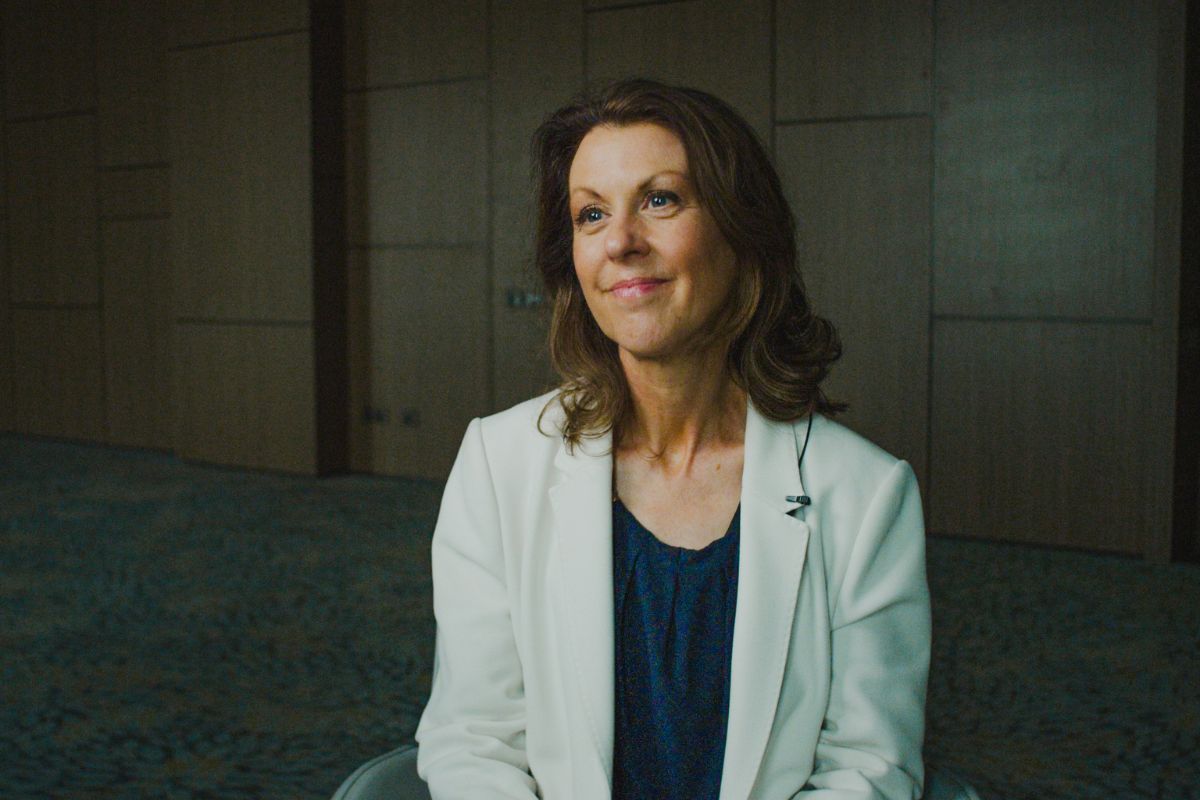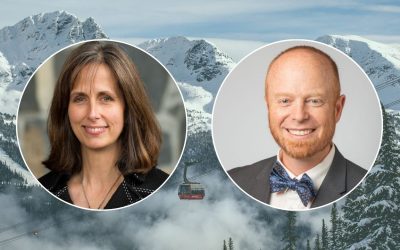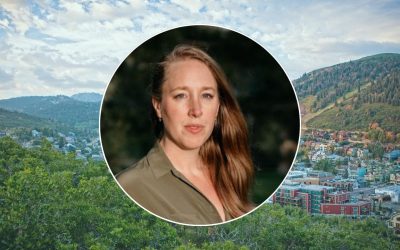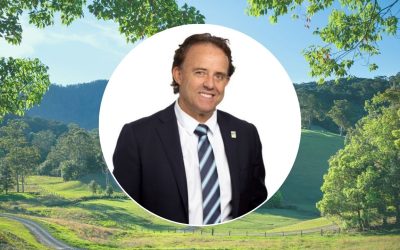“There’s movement in the right direction. We need to support that. But also I think as citizens ourselves, we have to say to our government, step up, do more and make that investment .”
– Aileen Crawford, Head of Tourism and Conventions at the Glasgow Convention Bureau
It was in Glasgow, Scotland where inventor James Watt spent considerable time in the leadup to his steam engine innovations that helped kick off the Industrial Revolution. More than two centuries later, the city is playing a leading role in global sustainability, says Aileen Crawford of the Glasgow Convention Bureau.
We spoke with Aileen about Glasgow’s marquee 2021 event, the 26th UN Climate Change Conference of the Parties, commonly known as COP26. The conference brought together world leaders, negotiators, activists, and stakeholders to discuss and negotiate actions to combat climate change. One outcome was the Glasgow Climate Pact.
In the wake of hosting COP26, Glasgow remains a city that champions innovation, driving toward an ambitious goal of net zero emissions by 2030. But getting “from steam to green” will require serious action. In this episode of our European Travel Leaders, Aileen talks about the how and why behind this destination’s ambitious vision for a sustainable future.
In this episode, you’ll learn:
- How sustainable innovations made Glasgow a prime candidate to host COP26.
- Why it’s important to make climate actions accessible to everyone.
- The ongoing impact of COP26 on Glasgow’s sustainability actions and its international reputation.
- Why tapping into the passion of individual citizens can lead to progress.
Subscribe on Apple Podcasts, Spotify, or your favourite podcast player to join us on this journey.
Show notes
Glasgow Climate Pact – An international declaration made at COP26 “aiming to turn the 2020s into a decade of climate action and support.”
Global Destination Sustainability Index – “The GDS-Movement serves to accelerate the transformation from destination marketing at whatever cost towards destination management and stewardship with shared value.”
United Nations COP26 – A global climate summit held in Glasgow, Scotland in 2021.
Episode transcript
Aileen Crawford: And when you get a group of very driven, passionate people who have a can-do attitude, and we’re there about solving the issue, not the ego, I think that really does make a difference. There’s movement in the right direction. We need to support that.
Sara Raymond de Booy: Hello and welcome to Travel Beyond, where we partner with leading destinations to explore the greatest challenges facing communities and the planet, surfacing their most inspiring solutions. I’m Sara Raymond de Booy, Associate Creative Director at Destination Think. I’m recording from Seattle, Washington on Coast Salish land, specifically that of the Duwamish, Suquamish, Stillaguamish, and Muckleshoot people.
We look at the role of travel and choose to highlight the destinations that are global leaders. We talk to the changemakers who are addressing regenerative travel through action in their communities, often from the bottom up.
We’re actively looking for the best examples of efforts to regenerate economies, communities, and ecosystems. So be sure to reach out if you have a story to share with us.
This time we’ll hear from Aileen Crawford, Head of Tourism and Conventions at Glasgow Convention Bureau. The story of Glasgow is one that’s always been rooted in innovation, and it’s been nearly two years since delegates representing around 200 countries met in Glasgow for COP26. The two weeks led to the adoption of the Glasgow Climate Pact, declaring this decade as a decade of climate action and support.
Delegates discussed deforestation and fossil fuel financing, committed to cutting global methane emissions, and more. To learn more about COP26 legacy and how it is still affecting tourism and life in Glasgow, Rodney sat down with Aileen Crawford at CityDNA’s recent conference. Here’s what she had to say.
Aileen Crawford: My name is Aileen Crawford and I’m the Head of Tourism and Conventions in Glasgow, Scotland.
Rodney Payne: You hosted COP26 two years ago now, where the Glasgow Declaration emerged. Can you talk a little bit about that event and the declaration?
Aileen Crawford: So COP26 was meant to be one year in the making, and because of obvious reasons, it was two years in the making.
And that extra time gave us space to consider what that legacy and impact as a host city and a host country could really mean for the industry. So from a city perspective, there was a team put in place that looked at the legacy of COP26 into the neighbourhood and into the schools, talking about “What does sustainability mean?” to primary school children.
We could never have done that if we didn’t have that extra time. And then there’s the industry itself, the meeting industry, also had with the Glasgow Declaration been able to challenge ourselves of why we meet and how we meet and who was going to be part of that solution. Very interestingly, the UN themselves, as UNFCCC, were also keen to be part of that too.
So, it was that collaborative force of getting the partners together and saying we can’t do this by ourselves, we have to do it together. We moved as an industry, and we support the Glasgow Declaration. But then when you saw the governments come together, we watch it on the news, we were obviously hooked on the news, maybe didn’t go as far as politics wanted it to go, but at least as far as we moved from Paris to Glasgow, we felt that our city and our country had driven something forward. Maybe not as much as we wanted, but at least we were all driving it. And then for tourism and for business events, we had our own project that we could all align to as well. So we’ve got our own legacy moving forward too.
Rodney Payne: If you think about the state of ambition before COP26 and now, can you describe what it was like and what it is now for Glasgow and Scotland?
Aileen Crawford: Indeed, so Glasgow was the first UK city to join the Global Destination Sustainability Index, and we joined in 2016. And it was very much a key strategy of where we were as a city, knowing that what the city was doing, moving from steam to green, was actually quite significant, but we weren’t articulating that story.
So where we saw that we could drive this forward, and we’re using tourism and events to do it, was the proof behind it. And Glasgow is ranked in the top 10 of the GDS Index cities ever since we joined. And there are many more cities and we are on a journey, but that definitely challenged us. So that was in 2016, before we knew we were the COP26 host city. But interestingly, as the UK government and the UN were looking at destinations, the fact that Glasgow was ranked on the GDS Index was one of the reasons cited for us being chosen as the host city. Along with many, but that authenticity and the credentials of saying, well actually, when we speak to your city about having the low-emission zone that comes in this June, about planning to be net zero by 2030, by considering how we’re moving to electric public transport, you have to be authentic and prove you’re doing it.
And Glasgow is where James Watt wandered our local park and came up with the idea of the steam condenser and started the Industrial Revolution. We’ve got a part to play in moving us into that more sustainable environment for tourism events, but also for our city.
Rodney Payne: It’s really cool to hear you talk in that way because it mirrors so much of what I’ve heard down in Queenstown. There’s also a little undercurrent there of pioneering. And I mean, a lot of Kiwis came from your part of the world, right? And they often tell me stories about how when you’re stuck at the bottom of the world on a remote Pacific island, you have to get really creative and fix problems. And it sounds sort of similar to what you’re saying, this humble ambition and leadership that the world really needs. Can you tell me about your goal and progress to be net zero by 2030?
Aileen Crawford: It’s also looking at the North Star internationally and those UN SDGs. And it was really interesting that we were using them through tourism events and our city embedded them into the climate action plan.
And they’d had a climate action plan in the past, and this is how does the city get to net zero 2030? And being on that world stage of saying, you need to prove how you’re going to do it. Their climate action plan is very accessible. You know, for anyone to go in and look at it, it’s, it’s color-coded to the UN SDGs.
It lists exactly where they’re looking at the biodiversity across the city. They’ve given it smart actions, and they’ve broken it down into small enough chunks that you can see yourself in it. You can see yourself as an events organisation, you see yourself as a business, you see yourself as transportation, rather than it being this huge, great, big figure that the carbon people don’t understand.
The city council has sustainability officers, and that came to fruition because of COP. It was like, who’s doing the doing? So we’ve got this fantastic team of people that is the lead for sustainability. And they are completely driven, academically minded, but they work at the heart of the city leading that sustainability team, and they have this action plan that they have to deliver.
But they’re not doing it by themselves, they draw in all of the other sectors and all the other areas, and we’ve all been given our own plans to say, well, if we’re writing a plan, we have to connect in. We’ve got to prove to you we’re doing it. And that’s when it comes down to how many hotels are accredited, you know, what you’re doing about active travel, what’s your airport doing for its sustainable credentials, because we’re all getting challenged and asked and note taken.
Rodney Payne: Can you tell me about the ambition that was galvanized around COP, going back to that earlier question. So before, where was sort of the state of ambition, in tourism or more broadly, Glasgow and Scotland, and now where?
Aileen Crawford: So I think the ambition definitely started in 2016 from that tourism and business events perspective, and it was all about storytelling.
It was trying to convince those that didn’t know Glasgow and Scotland that yes, we may have been that industrial heartland city, but look what’s happening now. We have innovation, those leading on sustainable transformation. Sustainable space invention they’re doing at Strathclyde University. Cleaning up space. It’s not just in our own backyard, but it’s that way that, you know, this is something that can go internationally, if you’ve got experts in the area. And tying that together in the steam to green story.
But the city has had the ambition because Scottish government led an ambition to say Scotland had to be net zero by 2045.
Now whether that is still a reachable target, it is there, but the city has kept their 2030 target. And we were lucky in that way, that COP26 came along to inject that urgency, because it was world stage, and leaders have to stand up and say this is what we’re doing. So that definitely generated that team to work closer. And the city launched the climate action plan. And subsequently each of the other sectors have to talk into that.
So we have our own tourism and conventions action plan, and we were supported through Travel Foundation, through government support funding to say we can’t leave you to it. We all have to work together. So there has been funding across Scotland to allow us all to align to the plans for Scottish government.
So it’s fundamentally been led at government level and at local government level. And then we’re all challenging each other to try and do the best we can even at individual business level, the local produce, the green accreditation at hotels. It’s the proof points. You have to prove it.
Rodney Payne: One of the topics that people are grappling with, I think more in Europe than I’m seeing in other parts of the world, is that a tourism industry exists because people come. And getting to a place is very energy intensive. And at the moment that has a lot of emissions associated with it. How does grappling with that, for Glasgow, sort of factor into your plans and the way you think about the future?
Aileen Crawford: It’s interesting being here at the CityDNA conference and seeing the facts and figures, the stats and the data, on long-haul flights especially has come up.
And that the scope, when we talk about the scope of when people are travelling, they’re the emissions. And we need to face that fact. We’re also in the tourism and events and conference industry. It’s a sector. It drives businesses. There’s 33,000 people in our city working in tourism and events. It’s a driver of our global reputation, especially when it comes to medical meetings in our city.
The fact that people have to meet, and we know that when people do meet, when we look at the business events, this is where engineers are coming together to find solutions to these key situations. Having two people meet in their own backyard is not going to drive innovation. We need people coming on visits, will make their responsible decisions.
I haven’t actually heard anybody say “don’t fly.” Where we go, how we go, being mindful of when we go somewhere. Are we going somewhere that is doing its very best to make that as a sustainable, environmentally friendly, responsible as possible. And that goes into the wider UN SDGs as well.
We’re talking about destinations that care for the people and care for their workforce. We talk about destinations that tolerate other people and ideas. You know, it’s a broader, it’s a broader world we look at. Fundamentally, the emissions has been a stark slide that we’ve seen today at the conference. But then, policy, government, sustainable air fuel, there’s movement in the right direction. We need to support that. But also I think as citizens ourselves, we have to say to our government, step up, do more and make, make that investment. Because if you invest in it, you’ll make the difference, because we all still want to travel.
Rodney Payne: Where does your passion come from and where do you think the ambition came from in Glasgow to lead and go quicker?
Aileen Crawford: Glasgow has always been a global city, an international city. You know, the roots, although Glasgow was established in 400 AD, really came to fruition in the late 1700s to early 1800s. And that was the Industrial Revolution.
And that was innovation, it was education. We’re a university city and a global city. And the passion from all of the Glaswegians is that we’re very passionate about our city and our country and want to tell a positive story. And that sometimes isn’t the case. So the only people that are going to stand up and say, this is what we’ve done and this is what our community can do, is ourselves.
And the university aspect of our city, that driving innovation, it’s a smaller city that we can get things done. And we rely very heavily on that government support, both local and national, to get us together and work together. And when you get a group of very driven, passionate people who have a can-do attitude, and we’re there about solving the issue, not the ego, I think that really does make a difference.
And that the city’s very driven in that way, and it has always encouraged, attracted innovators, ideas, people. Very driven in that way, and I hope that continues, and I hope we still get that drive and investment and we still attract the world’s best minds to live and invest, visit, meet in our city, because we need it.
And I hope that those that come to Glasgow feel that energy and commitment and can help us move forward together as well.
Rodney Payne: It’s really inspiring. Thanks for coming to spend a moment chatting today. And thank you for blazing a trail.
Aileen Crawford: Thank you very much, Rodney it’s great to be here.
Sara Raymond de Booy: This has been Travel Beyond, presented by Destination Think, and you just heard from Aileen Crawford, Head of Tourism and Conventions at the Glasgow Convention Bureau. We’ll include links to more resources on the blog for this episode at DestinationThink.com.
This episode has been produced and has theme music composed by David Archer. Lindsay Payne and Annika Rautiola provided production support. We’d like to thank CityDNA for making this interview possible at their conference in Bulgaria.
You can help more people find the show by subscribing to future episodes and by leaving a rating and review on Apple Podcasts. See you next time.










0 Comments